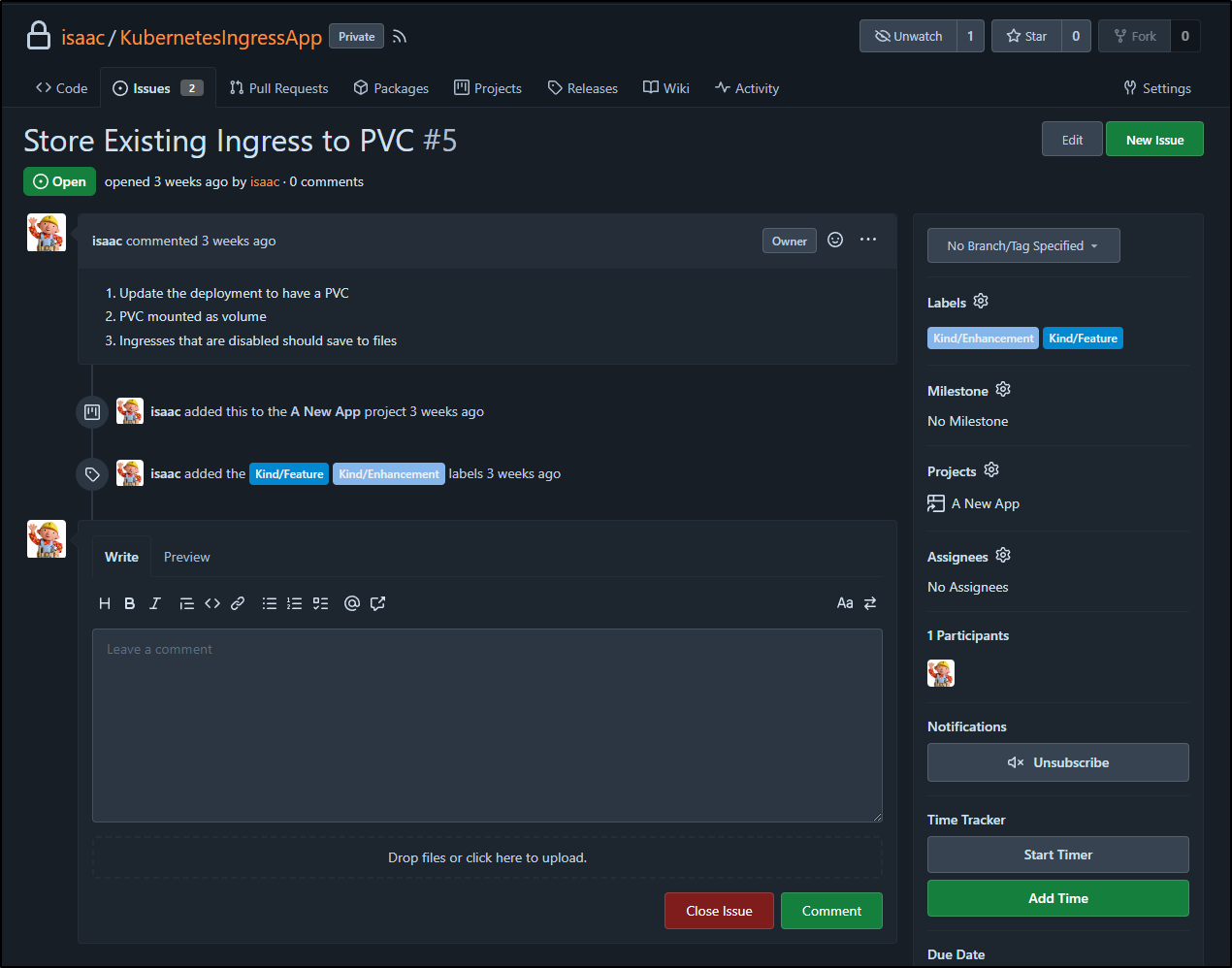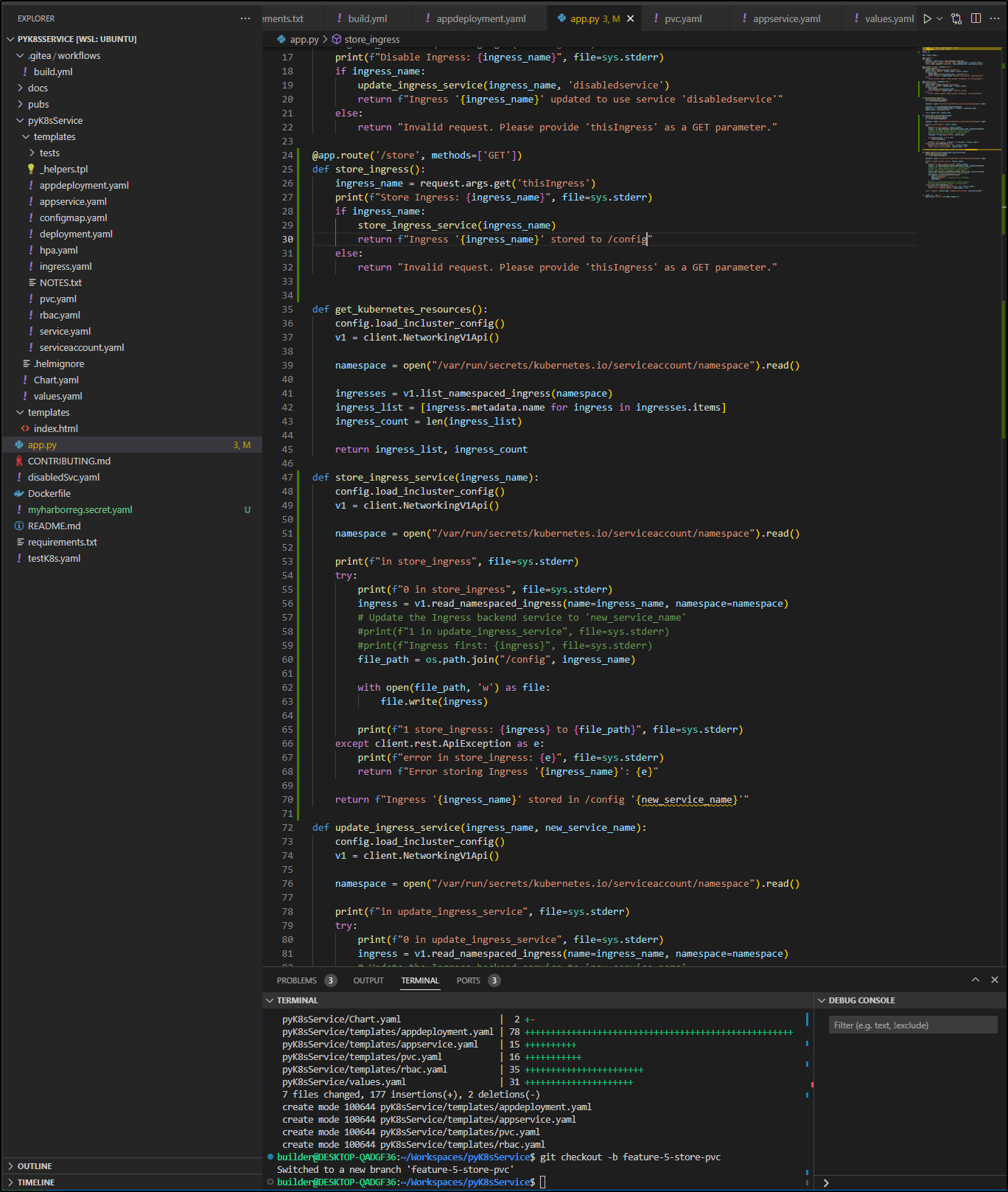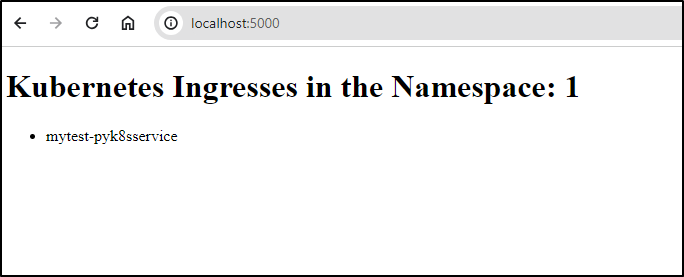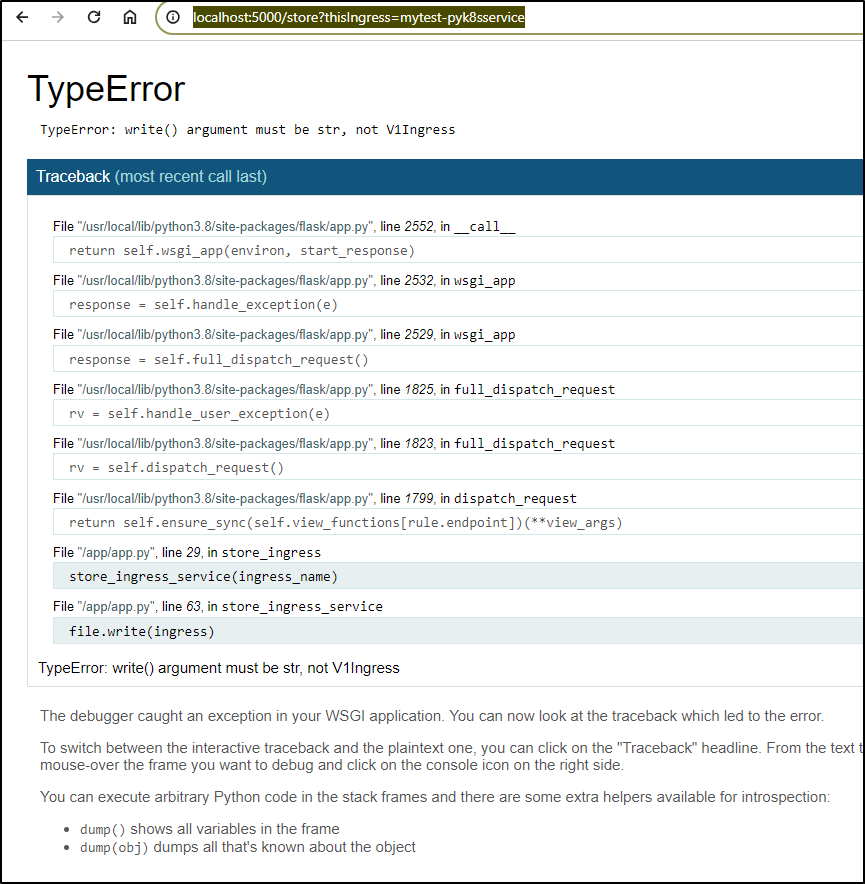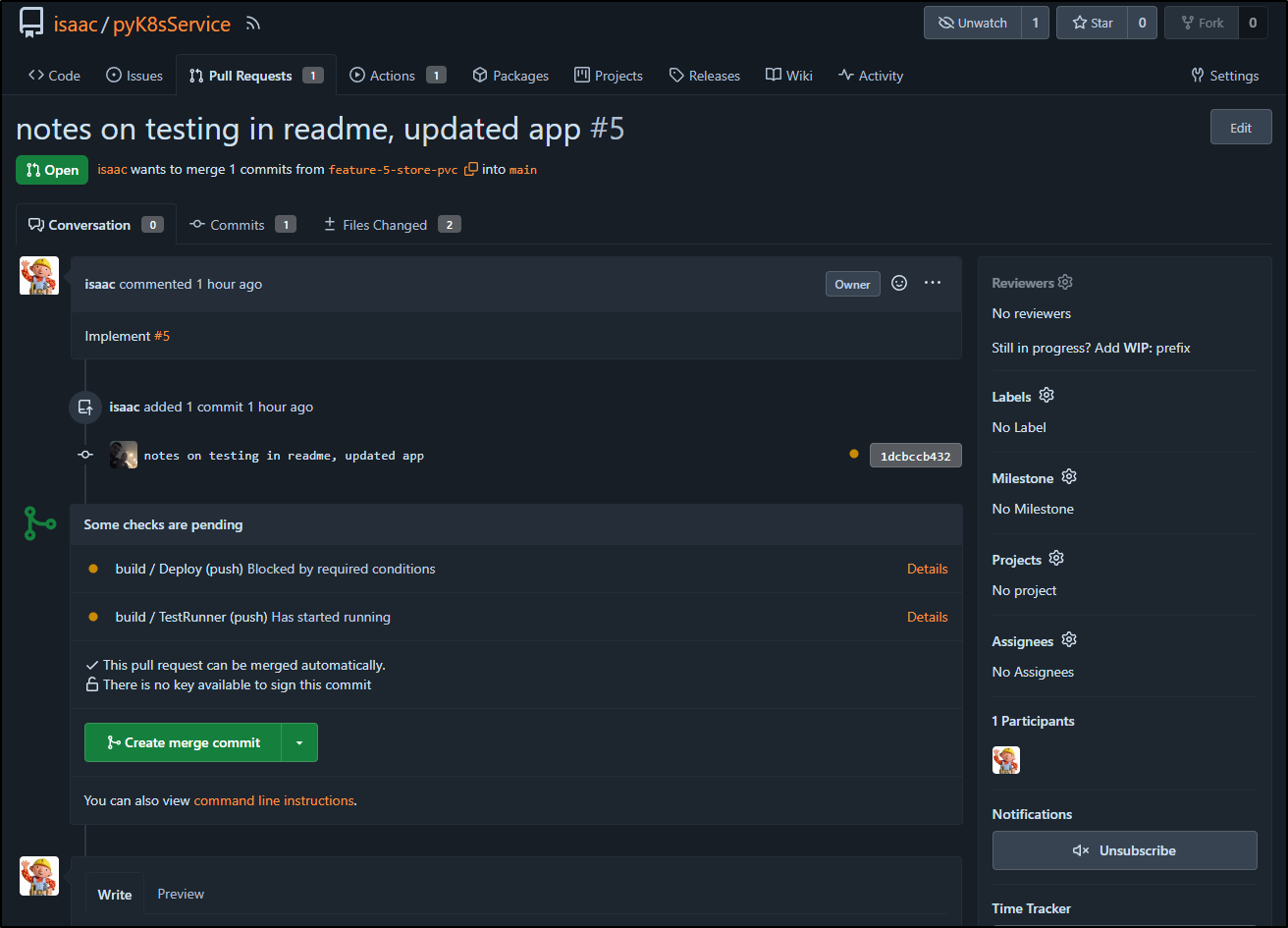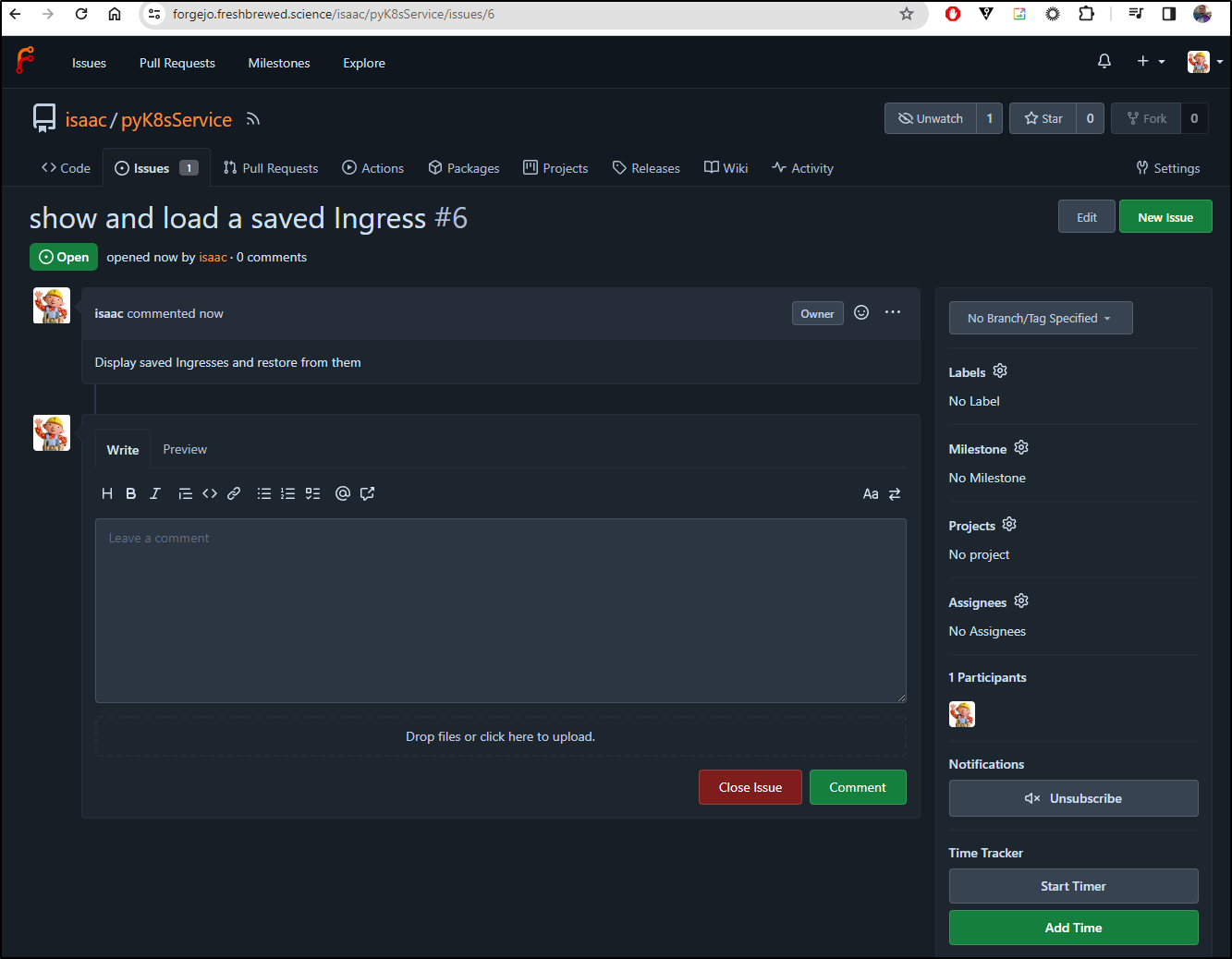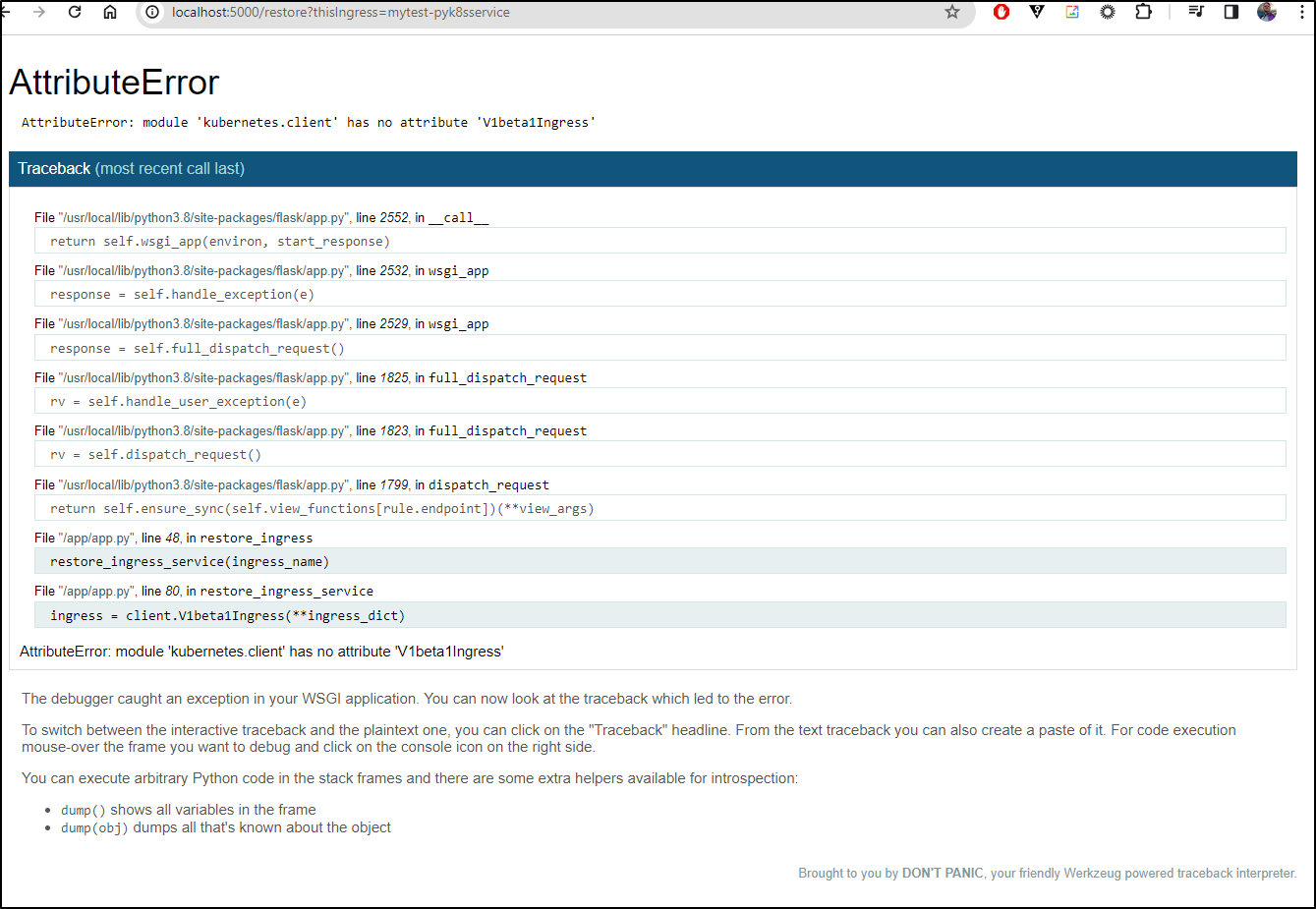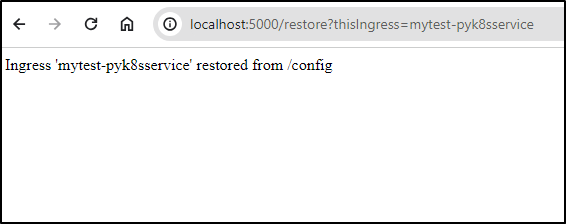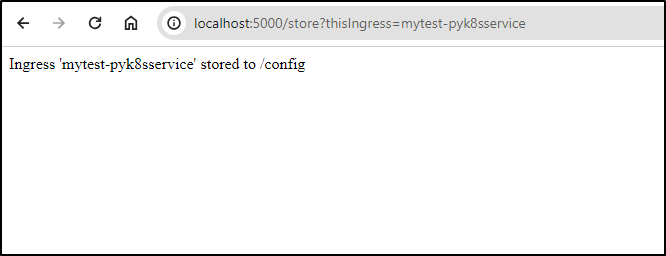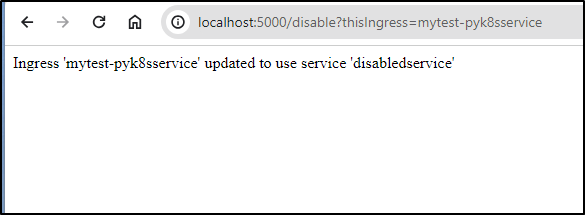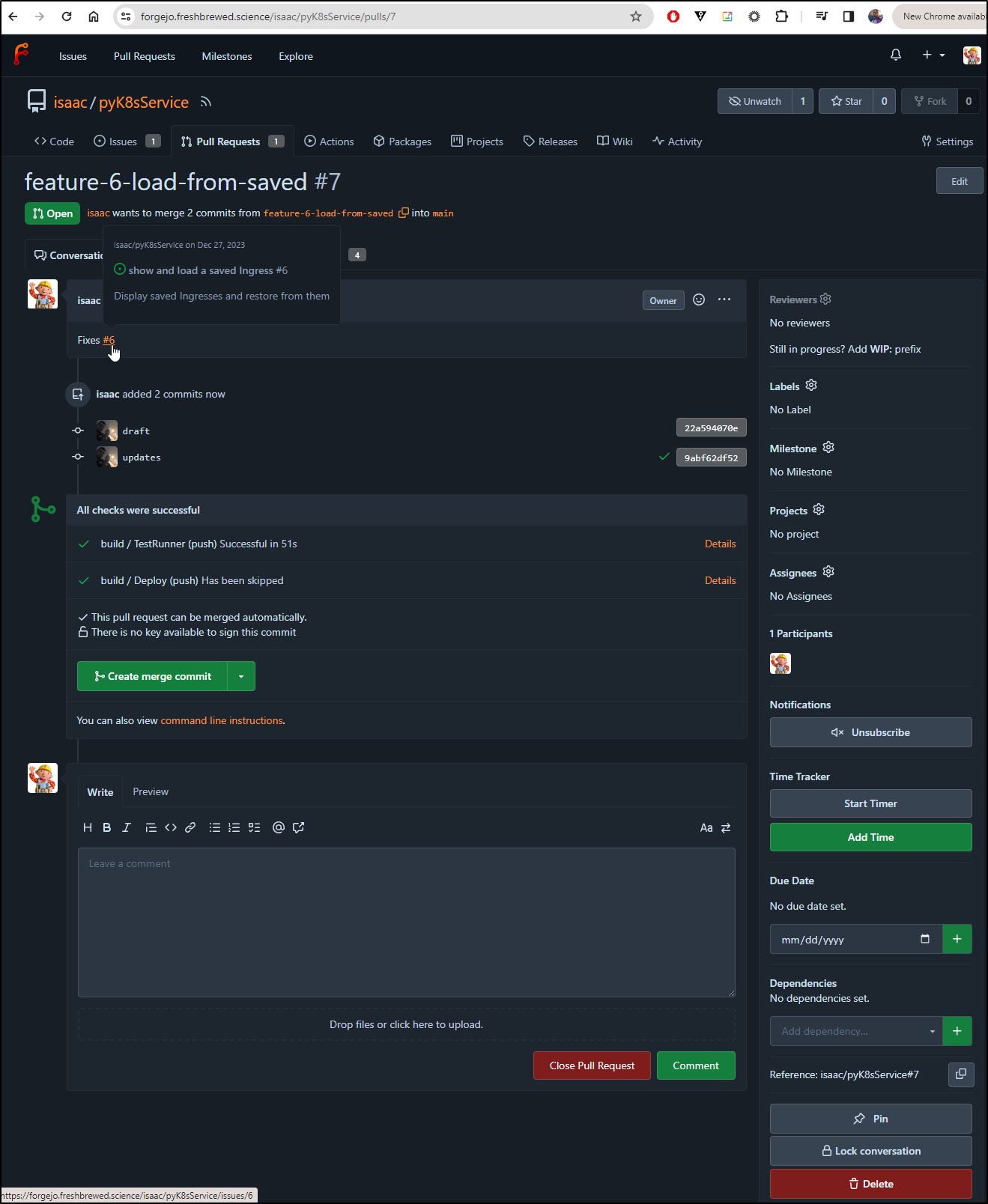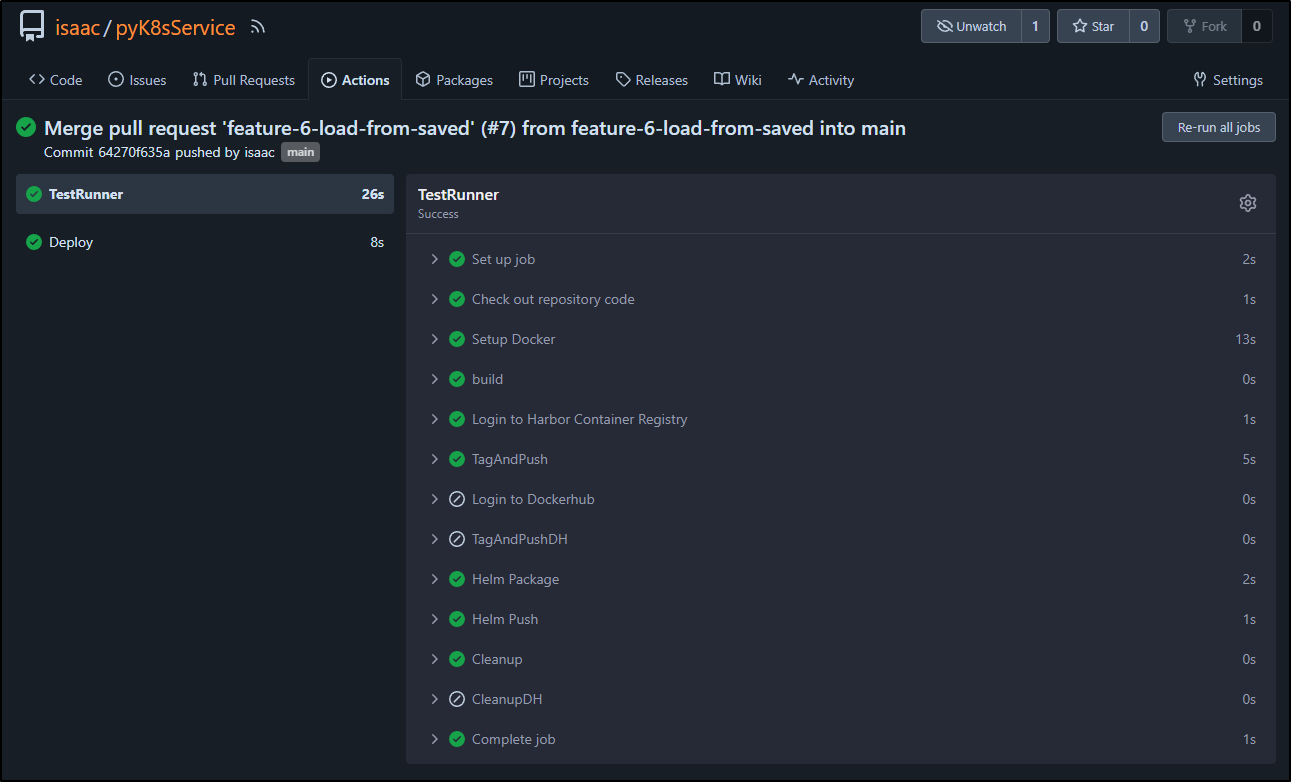Published: Jan 6, 2024 by Isaac Johnson
When we left off with Part 4 we had mostly automated the CI/CD flow for building and storing the container and charts. However, we punted on finishing the functionality of the app.
Today, let’s tackle changing how we store the YAML ingress/disabled. I also want to build out the templates repo and setup examples for Traefik, Nginx and Istio. Lastly, if I have time, I want to figure out a non-CR based helm repository endpoint for storing and sharing charts.
Update to store ingress files
As of last time, we launched the app and a basic Nginx “disabled” page:
builder@DESKTOP-QADGF36:~/Workspaces/pyK8sService$ helm list -n disabledtest
NAME NAMESPACE REVISION UPDATED STATUS CHART APP VERSION
mytest disabledtest 5 2023-12-25 23:20:43.932018982 -0600 CST deployed pyk8sservice-0.1.0 1.16.0
builder@DESKTOP-QADGF36:~/Workspaces/pyK8sService$ kubectl get pods -n disabledtest
NAME READY STATUS RESTARTS AGE
mytest-pyk8sservice-7d8798768f-9vgv8 1/1 Running 0 12h
mytest-pyk8sservice-app-74cc77666b-w8fpn 1/1 Running 0 11h
builder@DESKTOP-QADGF36:~/Workspaces/pyK8sService$ kubectl get svc -n disabledtest
NAME TYPE CLUSTER-IP EXTERNAL-IP PORT(S) AGE
mytest-pyk8sservice ClusterIP 10.43.179.105 <none> 80/TCP 12h
mytest-pyk8sservice-app ClusterIP 10.43.206.218 <none> 5000/TCP 12h
From the app deployment chart we can see that we mount the pvc to /config.
The first change I want to make is to store the existing Ingress into that mount. We originally wrote this up as Feature #5
I’ll now create a branch for it (feature-5-store-pvc) and make some initial changes
I’ll test by building locally
builder@DESKTOP-QADGF36:~/Workspaces/pyK8sService$ docker build -t harbor.freshbrewed.science/freshbrewedprivate/pyk8singresssvc:test0501 .
[+] Building 13.9s (10/10) FINISHED
=> [internal] load build definition from Dockerfile 0.0s
=> => transferring dockerfile: 193B 0.0s
=> [internal] load .dockerignore 0.0s
=> => transferring context: 2B 0.0s
=> [internal] load metadata for docker.io/library/python:3.8-slim 2.0s
=> [1/5] FROM docker.io/library/python:3.8-slim@sha256:d1cba0f8754d097bd333b8f3d4c655f37c2ede9042d1 1.5s
=> => resolve docker.io/library/python:3.8-slim@sha256:d1cba0f8754d097bd333b8f3d4c655f37c2ede9042d1 0.0s
=> => sha256:8ce3f2b601ccac03ff1858022363c325355bafba224123a4563dade58bc8e70f 3.51MB / 3.51MB 0.2s
=> => sha256:7f4f85c41831fbd0f3274211b4400f992d8e7a77938d86a5d24bc7af2e8df503 13.75MB / 13.75MB 0.5s
=> => sha256:61e3cec0af2bf2f5a7e75b87fb4daeeef94d7054b09c461a9da8604f805a1806 244B / 244B 0.2s
=> => sha256:d1cba0f8754d097bd333b8f3d4c655f37c2ede9042d1e7db69561d9eae2eebfa 1.86kB / 1.86kB 0.0s
=> => sha256:514ad38605babc4749a1dfb47a800a9ad30e97795ea3c52390a8cdd8a0d5952c 1.37kB / 1.37kB 0.0s
=> => sha256:067655fb1c0910227ec88b6bc6bc18d6697f82e80ab04a2ce00f36879df9b36e 6.97kB / 6.97kB 0.0s
=> => sha256:8244879b209cbcd120ac0c4a2bd01d70ee60cc770924a99c1948b6698ea4d2af 3.13MB / 3.13MB 0.4s
=> => extracting sha256:8ce3f2b601ccac03ff1858022363c325355bafba224123a4563dade58bc8e70f 0.3s
=> => extracting sha256:7f4f85c41831fbd0f3274211b4400f992d8e7a77938d86a5d24bc7af2e8df503 0.5s
=> => extracting sha256:61e3cec0af2bf2f5a7e75b87fb4daeeef94d7054b09c461a9da8604f805a1806 0.0s
=> => extracting sha256:8244879b209cbcd120ac0c4a2bd01d70ee60cc770924a99c1948b6698ea4d2af 0.2s
=> [internal] load build context 0.2s
=> => transferring context: 153.31kB 0.1s
=> [2/5] WORKDIR /app 0.1s
=> [3/5] COPY requirements.txt . 0.0s
=> [4/5] RUN pip install --no-cache-dir -r requirements.txt 9.0s
=> [5/5] COPY . . 0.1s
=> exporting to image 0.4s
=> => exporting layers 0.4s
=> => writing image sha256:ad61fb8404c926e0748514b81aaf985f96cf8513d39fde4799e81f8224e45117 0.0s
=> => naming to harbor.freshbrewed.science/freshbrewedprivate/pyk8singresssvc:test0501 0.0s
Then push
builder@DESKTOP-QADGF36:~/Workspaces/pyK8sService$ docker push harbor.freshbrewed.science/freshbrewedprivate/pyk8singresssvc:test0501
The push refers to repository [harbor.freshbrewed.science/freshbrewedprivate/pyk8singresssvc]
577ac6d2efff: Pushed
63699480bf04: Pushed
095f4ccf99ba: Pushed
f96fd631fd42: Pushed
148dc688e60f: Layer already exists
009aa92f6140: Layer already exists
ad7efa606e4e: Layer already exists
384858ccd7ef: Layer already exists
7292cf786aa8: Layer already exists
test0501: digest: sha256:1c77454910f2b4ebc3ab201b9c19b2e17d6983b184ec444e3bb2f31540f3a4b0 size: 2203
I then changed the deployment manually to set the image: and added an imagePullSecrets: section to the deployment to test
spec:
containers:
- image: harbor.freshbrewed.science/freshbrewedprivate/pyk8singresssvc:test0501
imagePullPolicy: Always
livenessProbe:
failureThreshold: 3
httpGet:
path: /
port: http
scheme: HTTP
periodSeconds: 10
successThreshold: 1
timeoutSeconds: 1
name: pyk8sservice
ports:
- containerPort: 5000
name: http
protocol: TCP
readinessProbe:
failureThreshold: 3
httpGet:
path: /
port: http
scheme: HTTP
periodSeconds: 10
successThreshold: 1
timeoutSeconds: 1
resources: {}
securityContext: {}
terminationMessagePath: /dev/termination-log
terminationMessagePolicy: File
volumeMounts:
- mountPath: /config
name: config
dnsPolicy: ClusterFirst
imagePullSecrets:
- name: myharborreg
Actually, I came around and opted to try to use this chart to create an ingress I could use. I ended up messing up my local deploy, so i removed/deleted then re-installed:
$ cat myvalues.yaml
appservice:
port: 5000
persistence:
storageClass: local-path
rbac:
create: true
appimage:
repository: harbor.freshbrewed.science/freshbrewedprivate/pyk8singresssvc
pullPolicy: Always
tag: "test0501"
appimagePullSecrets:
- name: myharborreg
ingress:
enabled: true
className: "traefik"
annotations:
kubernetes.io/ingress.class: traefik
# kubernetes.io/tls-acme: "true"
hosts:
- host: pytestapp.local
paths:
- path: /
pathType: ImplementationSpecific
tls:
- secretName: chart-example-tls
hosts:
- chart-example.local
$ helm install mytest -n disabledtest -f myvalues.yaml ./pyK8sService/
NAME: mytest
LAST DEPLOYED: Wed Dec 27 12:02:35 2023
NAMESPACE: disabledtest
STATUS: deployed
REVISION: 1
NOTES:
1. Get the application URL by running these commands:
https://pytestapp.local/
I can now see the pods running
$ kubectl get pods -n disabledtest
NAME READY STATUS RESTARTS AGE
mytest-pyk8sservice-app-5f67b78b94-rdtmg 1/1 Running 0 49s
mytest-pyk8sservice-7d8798768f-9pwcb 1/1 Running 0 49s
with an Ingress I can use for testing
$ kubectl get ingress -n disabledtest
NAME CLASS HOSTS ADDRESS PORTS AGE
mytest-pyk8sservice traefik pytestapp.local 192.168.1.13,192.168.1.159,192.168.1.206 80, 443 5m40s
We can now test
$ kubectl port-forward svc/mytest-pyk8sservice-app -n disabledtest 5000:5000
Forwarding from 127.0.0.1:5000 -> 5000
Forwarding from [::1]:5000 -> 5000
Handling connection for 5000
Handling connection for 5000
I then typed in a URL i hoped would work: http://localhost:5000/store?thisIngress=mytest-pyk8sservice
And boom, what one gets when they forget to cast to string
It took a bit of tweaking, but I landed on the following app.py code:
from flask import Flask, render_template, request
from kubernetes import client, config
import sys
import os
import yaml
app = Flask(__name__)
@app.route('/')
def index():
ingresses, ingress_count = get_kubernetes_resources()
print(f"Number of Ingress resources found: {ingress_count}", file=sys.stderr)
return render_template('index.html', resources=ingresses, count=ingress_count)
@app.route('/disable', methods=['GET'])
def disable_ingress():
ingress_name = request.args.get('thisIngress')
print(f"Disable Ingress: {ingress_name}", file=sys.stderr)
if ingress_name:
update_ingress_service(ingress_name, 'disabledservice')
return f"Ingress '{ingress_name}' updated to use service 'disabledservice'"
else:
return "Invalid request. Please provide 'thisIngress' as a GET parameter."
@app.route('/store', methods=['GET'])
def store_ingress():
ingress_name = request.args.get('thisIngress')
print(f"Store Ingress: {ingress_name}", file=sys.stderr)
if ingress_name:
store_ingress_service(ingress_name)
return f"Ingress '{ingress_name}' stored to /config"
else:
return "Invalid request. Please provide 'thisIngress' as a GET parameter."
def get_kubernetes_resources():
config.load_incluster_config()
v1 = client.NetworkingV1Api()
namespace = open("/var/run/secrets/kubernetes.io/serviceaccount/namespace").read()
ingresses = v1.list_namespaced_ingress(namespace)
ingress_list = [ingress.metadata.name for ingress in ingresses.items]
ingress_count = len(ingress_list)
return ingress_list, ingress_count
def store_ingress_service(ingress_name):
config.load_incluster_config()
v1 = client.NetworkingV1Api()
namespace = open("/var/run/secrets/kubernetes.io/serviceaccount/namespace").read()
print(f"in store_ingress", file=sys.stderr)
try:
print(f"0 in store_ingress", file=sys.stderr)
ingress = v1.read_namespaced_ingress(name=ingress_name, namespace=namespace)
# Update the Ingress backend service to 'new_service_name'
#print(f"1 in update_ingress_service", file=sys.stderr)
#print(f"Ingress first: {ingress}", file=sys.stderr)
#file_path = os.path.join("/config", ingress_name, ".yaml")
file_path = f"/config/{ingress_name}.yaml"
ingress_dict = ingress.to_dict()
ingress_yaml = yaml.dump(ingress_dict)
with open(file_path, 'w') as file:
file.write(ingress_yaml)
print(f"1 store_ingress: {ingress} to {file_path}", file=sys.stderr)
except client.rest.ApiException as e:
print(f"error in store_ingress: {e}", file=sys.stderr)
return f"Error storing Ingress '{ingress_name}': {e}"
return f"Ingress '{ingress_name}' stored in /config '{ingress_name}'"
def update_ingress_service(ingress_name, new_service_name):
config.load_incluster_config()
v1 = client.NetworkingV1Api()
namespace = open("/var/run/secrets/kubernetes.io/serviceaccount/namespace").read()
print(f"in update_ingress_service", file=sys.stderr)
try:
print(f"0 in update_ingress_service", file=sys.stderr)
ingress = v1.read_namespaced_ingress(name=ingress_name, namespace=namespace)
# Update the Ingress backend service to 'new_service_name'
#print(f"1 in update_ingress_service", file=sys.stderr)
#print(f"Ingress first: {ingress}", file=sys.stderr)
ingress.spec.rules[0].http.paths[0].backend.service.name = new_service_name
#print(f"2 in update_ingress_service", file=sys.stderr)
api_response = v1.patch_namespaced_ingress(
name='rundeckingress',
namespace='default', # replace with your namespace
body=ingress
)
#print(f"3 in update_ingress_service", file=sys.stderr)
#print(f"Ingress second: {ingress}", file=sys.stderr)
except client.rest.ApiException as e:
print(f"error in update_ingress_service: {e}", file=sys.stderr)
return f"Error updating Ingress '{ingress_name}': {e}"
return f"Ingress '{ingress_name}' updated to use service '{new_service_name}'"
if __name__ == '__main__':
app.run(host='0.0.0.0', port=5000, debug=True)
Which when tested
$ kubectl port-forward svc/mytest-pyk8sservice-app -n disabledtest 5000:5000
Forwarding from 127.0.0.1:5000 -> 5000
Forwarding from [::1]:5000 -> 5000
Handling connection for 5000
Handling connection for 5000
Said it saved the file:
We can actually verify that by cat’ing out the file
$ kubectl exec mytest-pyk8sservice-app-6cdd6d756f-bfnfr -n disabledtest cat '/config/mytest-pyk8sservice.yaml'
kubectl exec [POD] [COMMAND] is DEPRECATED and will be removed in a future version. Use kubectl exec [POD] -- [COMMAND] instead.
api_version: networking.k8s.io/v1
kind: Ingress
metadata:
annotations:
kubernetes.io/ingress.class: traefik
meta.helm.sh/release-name: mytest
meta.helm.sh/release-namespace: disabledtest
creation_timestamp: 2023-12-27 18:02:36+00:00
deletion_grace_period_seconds: null
deletion_timestamp: null
finalizers: null
generate_name: null
generation: 1
labels:
app.kubernetes.io/instance: mytest
app.kubernetes.io/managed-by: Helm
app.kubernetes.io/name: pyk8sservice
app.kubernetes.io/version: 1.16.0
helm.sh/chart: pyk8sservice-0.2.0
managed_fields:
- api_version: networking.k8s.io/v1
fields_type: FieldsV1
fields_v1:
f:metadata:
f:annotations:
.: {}
f:kubernetes.io/ingress.class: {}
f:meta.helm.sh/release-name: {}
f:meta.helm.sh/release-namespace: {}
f:labels:
.: {}
f:app.kubernetes.io/instance: {}
f:app.kubernetes.io/managed-by: {}
f:app.kubernetes.io/name: {}
f:app.kubernetes.io/version: {}
f:helm.sh/chart: {}
f:spec:
f:ingressClassName: {}
f:rules: {}
f:tls: {}
manager: helm
operation: Update
subresource: null
time: 2023-12-27 18:02:36+00:00
- api_version: networking.k8s.io/v1
fields_type: FieldsV1
fields_v1:
f:status:
f:loadBalancer:
f:ingress: {}
manager: traefik
operation: Update
subresource: status
time: 2023-12-27 18:02:36+00:00
name: mytest-pyk8sservice
namespace: disabledtest
owner_references: null
resource_version: '8438650'
self_link: null
uid: 56eed306-e43c-409b-9d17-b07f6a270c0d
spec:
default_backend: null
ingress_class_name: traefik
rules:
- host: pytestapp.local
http:
paths:
- backend:
resource: null
service:
name: mytest-pyk8sservice
port:
name: null
number: 80
path: /
path_type: ImplementationSpecific
tls:
- hosts:
- chart-example.local
secret_name: chart-example-tls
status:
load_balancer:
ingress:
- hostname: null
ip: 192.168.1.13
ports: null
- hostname: null
ip: 192.168.1.159
ports: null
- hostname: null
ip: 192.168.1.206
ports: null
And prove it’s in the PVC by deleting the pod and doing it again:
$ kubectl exec mytest-pyk8sservice-app-6cdd6d756f-nwf6q -n disabledtest -- bash -c 'ls -l /
config/'
total 8
-rw-r--r-- 1 root root 2342 Dec 27 18:31 mytest-pyk8sservice
-rw-r--r-- 1 root root 2342 Dec 27 18:36 mytest-pyk8sservice.yaml
note: the file without a .yaml was from an earlier test
I’m happy enough with this incremental progress to push the changes back to GIT
I then created a PR #5
Now that we have Ingress objects set aside, how hard would it be to restore from them?
Let’s write a Ticket for that:
I created a new branch and then wrote routines to list and restore from file
@app.route('/saved', methods=['GET'])
def showsaved_ingress():
filenames = os.listdir('/config')
ingress_count = len(filenames)
print(f"1 show saved ingresses in /config: {ingress_count} total", file=sys.stderr)
return render_template('restore.html', resources=filenames, count=ingress_count)
@app.route('/restore', methods=['GET'])
def restore_ingress():
ingress_name = request.args.get('thisIngress')
print(f"Restore Ingress: {ingress_name}", file=sys.stderr)
if ingress_name:
restore_ingress_service(ingress_name)
return f"Ingress '{ingress_name}' restored from /config"
else:
return "Invalid request. Please provide 'thisIngress' as a GET parameter."
#==================================================================
def restore_ingress_service(ingress_name):
config.load_incluster_config()
v1 = client.NetworkingV1Api()
namespace = open("/var/run/secrets/kubernetes.io/serviceaccount/namespace").read()
print(f"in store_ingress", file=sys.stderr)
v1 = client.NetworkingV1Api()
print(f"0 in restore ingress", file=sys.stderr)
# Remove IFF exists
try:
v1.delete_namespaced_ingress(name=ingress_name, namespace=namespace)
except client.exceptions.ApiException as e:
if e.status != 404: # Ignore error if the ingress does not exist
raise
# Now try and restore it
print(f"1 in restore ingress", file=sys.stderr)
try:
file_path = f"/config/{ingress_name}.yaml"
with open(file_path, 'r') as file:
ingress_dict = yaml.safe_load(file)
# Convert Dict back to an Ingress Object
ingress = client.V1beta1Ingress(**ingress_dict)
# ingress_name = ingress.metadata.name
v1.create_namespaced_ingress(namespace=namespace, body=ingress)
except client.rest.ApiException as e:
print(f"error in restore: {e}", file=sys.stderr)
return f"Error restoring Ingress '{ingress_name}': {e}"
return f"Ingress '{ingress_name}' restored from /config '{ingress_name}'"
I did the usual local build and push:
builder@DESKTOP-QADGF36:~/Workspaces/pyK8sService$ docker push harbor.freshbrewed.science/freshbrewedprivate/pyk8singresssvc:test0601 .
"docker push" requires exactly 1 argument.
See 'docker push --help'.
Usage: docker push [OPTIONS] NAME[:TAG]
Push an image or a repository to a registry
builder@DESKTOP-QADGF36:~/Workspaces/pyK8sService$ docker push harbor.freshbrewed.science/freshbrewedprivate/pyk8singresssvc:test0601
The push refers to repository [harbor.freshbrewed.science/freshbrewedprivate/pyk8singresssvc]
8fe78eea7bfd: Pushed
63699480bf04: Layer already exists
095f4ccf99ba: Layer already exists
f96fd631fd42: Layer already exists
148dc688e60f: Layer already exists
009aa92f6140: Layer already exists
ad7efa606e4e: Layer already exists
384858ccd7ef: Layer already exists
7292cf786aa8: Layer already exists
test0601: digest: sha256:ea38d03be384df9f481b35a64c113f3b8a3e375c5bff3ec8e4e7c7c853782093 size: 2203
a helm upgrade to use that image
$ helm upgrade mytest -n disabledtest -f myvalues.yaml ./pyK8sService/
Release "mytest" has been upgraded. Happy Helming!
NAME: mytest
LAST DEPLOYED: Wed Dec 27 14:41:18 2023
NAMESPACE: disabledtest
STATUS: deployed
REVISION: 8
NOTES:
1. Get the application URL by running these commands:
https://pytestapp.local/
Then a port-forward to test
builder@DESKTOP-QADGF36:~/Workspaces/pyK8sService$ kubectl port-forward svc/mytest-pyk8sservice-app -n disabledtest 5000:5000
Forwarding from 127.0.0.1:5000 -> 5000
Forwarding from [::1]:5000 -> 5000
Handling connection for 5000
Handling connection for 5000
It would seem listing works just dandy
Though my restore fell down
I realized that I needed to switch to just “V1Ingress” in the class
try:
file_path = f"/config/{ingress_name}.yaml"
with open(file_path, 'r') as file:
ingress_dict = yaml.safe_load(file)
# Convert Dict back to an Ingress Object
ingress = client.V1Ingress(**ingress_dict)
# ingress_name = ingress.metadata.name
v1.create_namespaced_ingress(namespace=namespace, body=ingress)
Now a build and push and test works
However, I don’t actually see it created
builder@DESKTOP-QADGF36:~/Workspaces/pyK8sService$ kubectl get ingress -n disabledtest
No resources found in disabledtest namespace.
Logs show us something is amiss
$ kubectl logs mytest-pyk8sservice-app-b587b498b-nlwhc -n disabledtest
* Serving Flask app 'app'
* Debug mode: on
WARNING: This is a development server. Do not use it in a production deployment. Use a production WSGI server instead.
* Running on all addresses (0.0.0.0)
* Running on http://127.0.0.1:5000
* Running on http://10.42.0.64:5000
Press CTRL+C to quit
* Restarting with stat
* Debugger is active!
* Debugger PIN: 127-226-652
Number of Ingress resources found: 1
10.42.0.1 - - [27/Dec/2023 20:50:59] "GET / HTTP/1.1" 200 -
Number of Ingress resources found: 1
Number of Ingress resources found: 1
10.42.0.1 - - [27/Dec/2023 20:51:07] "GET / HTTP/1.1" 200 -
10.42.0.1 - - [27/Dec/2023 20:51:07] "GET / HTTP/1.1" 200 -
Restore Ingress: mytest-pyk8sservice
in store_ingress
0 in restore ingress
1 in restore ingress
error in restore: (422)
Reason: Unprocessable Entity
HTTP response headers: HTTPHeaderDict({'Audit-Id': '7d07b45d-7c9c-40eb-934a-c715fb37533a', 'Cache-Control': 'no-cache, private', 'Content-Type': 'application/json', 'Warning': '299 - "unknown field \\"metadata.creation_timestamp\\"", 299 - "unknown field \\"metadata.deletion_grace_period_seconds\\"", 299 - "unknown field \\"metadata.deletion_timestamp\\"", 299 - "unknown field \\"metadata.generate_name\\"", 299 - "unknown field \\"metadata.managed_fields\\"", 299 - "unknown field \\"metadata.owner_references\\"", 299 - "unknown field \\"metadata.resource_version\\"", 299 - "unknown field \\"metadata.self_link\\"", 299 - "unknown field \\"spec.default_backend\\"", 299 - "unknown field \\"spec.ingress_class_name\\"", 299 - "unknown field \\"spec.rules[0].http.paths[0].path_type\\"", 299 - "unknown field \\"spec.tls[0].secret_name\\"", 299 - "unknown field \\"status.load_balancer\\""', 'X-Kubernetes-Pf-Flowschema-Uid': '9d2994dc-4137-4742-91f2-ef281ef01ff2', 'X-Kubernetes-Pf-Prioritylevel-Uid': '70d13cea-624c-4356-af78-6b13c6d82bba', 'Date': 'Wed, 27 Dec 2023 20:51:15 GMT', 'Content-Length': '471'})
HTTP response body: {"kind":"Status","apiVersion":"v1","metadata":{},"status":"Failure","message":"Ingress.extensions \"mytest-pyk8sservice\" is invalid: spec.rules[0].http.paths[0].pathType: Required value: pathType must be specified","reason":"Invalid","details":{"name":"mytest-pyk8sservice","group":"extensions","kind":"Ingress","causes":[{"reason":"FieldValueRequired","message":"Required value: pathType must be specified","field":"spec.rules[0].http.paths[0].pathType"}]},"code":422}
127.0.0.1 - - [27/Dec/2023 20:51:15] "GET /restore?thisIngress=mytest-pyk8sservice HTTP/1.1" 200 -
Number of Ingress resources found: 0
Number of Ingress resources found: 0
10.42.0.1 - - [27/Dec/2023 20:51:17] "GET / HTTP/1.1" 200 -
10.42.0.1 - - [27/Dec/2023 20:51:17] "GET / HTTP/1.1" 200 -
Number of Ingress resources found: 0
10.42.0.1 - - [27/Dec/2023 20:51:27] "GET / HTTP/1.1" 200 -
Number of Ingress resources found: 0
10.42.0.1 - - [27/Dec/2023 20:51:27] "GET / HTTP/1.1" 200 -
Number of Ingress resources found: 0
10.42.0.1 - - [27/Dec/2023 20:51:37] "GET / HTTP/1.1" 200 -
I used a lot of debug and found it just was vommitting on the parsed YAML. I decided to pivot to the utils apply method instead.
From
def restore_ingress_service(ingress_name):
config.load_incluster_config()
v1 = client.NetworkingV1Api()
namespace = open("/var/run/secrets/kubernetes.io/serviceaccount/namespace").read()
print(f"in restore ingress", file=sys.stderr)
v1 = client.NetworkingV1Api()
print(f"0 in restore ingress", file=sys.stderr)
# Remove IFF exists
try:
v1.delete_namespaced_ingress(name=ingress_name, namespace=namespace)
except client.exceptions.ApiException as e:
if e.status != 404: # Ignore error if the ingress does not exist
raise
# Now try and restore it
print(f"1 in restore ingress", file=sys.stderr)
try:
file_path = f"/config/{ingress_name}.yaml"
print(f"1a Restore Ingress: {file_path}", file=sys.stderr)
with open(file_path, 'r') as file:
ingress_dict = yaml.safe_load(file)
print(f"1b Restore Ingress: {ingress_dict}", file=sys.stderr)
# Convert Dict back to an Ingress Object
ingress = client.V1Ingress(**ingress_dict)
print(f"1c Restore Ingress: {ingress}", file=sys.stderr)
# ingress_name = ingress.metadata.name
v1.create_namespaced_ingress(namespace=namespace, body=ingress)
print(f"1d Restored Ingress: {ingress_name}", file=sys.stderr)
except client.rest.ApiException as e:
print(f"error in restore: {e}", file=sys.stderr)
return f"Error restoring Ingress '{ingress_name}': {e}"
print(f"2 Restored Ingress: {ingress_name}", file=sys.stderr)
return f"Ingress '{ingress_name}' restored from /config '{ingress_name}'"
to:
from kubernetes import client, config, utils
#... snip ...
def restore_ingress_service(ingress_name):
config.load_incluster_config()
apiClient = client.ApiClient()
namespace = open("/var/run/secrets/kubernetes.io/serviceaccount/namespace").read()
print(f"in restore ingress", file=sys.stderr)
v1 = client.NetworkingV1Api()
print(f"0 in restore ingress", file=sys.stderr)
# Remove IFF exists
try:
v1.delete_namespaced_ingress(name=ingress_name, namespace=namespace)
except client.exceptions.ApiException as e:
if e.status != 404: # Ignore error if the ingress does not exist
raise
# Now try and restore it
print(f"1 in restore ingress", file=sys.stderr)
try:
file_path = f"/config/{ingress_name}.yaml"
print(f"1a Restore Ingress: {file_path}", file=sys.stderr)
# Apply the manifest
utils.create_from_yaml(apiClient, file_path)
print(f"1d Restored Ingress: {ingress_name}", file=sys.stderr)
except client.rest.ApiException as e:
print(f"error in restore: {e}", file=sys.stderr)
return f"Error restoring Ingress '{ingress_name}': {e}"
print(f"2 Restored Ingress: {ingress_name}", file=sys.stderr)
return f"Ingress '{ingress_name}' restored from /config '{ingress_name}'"
Actually, this ran into another issue - the V1 api was storing the YAML with “api_version” not “apiVersion”.
$ kubectl exec `kubectl get pods -l app.kubernetes.io/instance=mytest-app -n disabledtest -o=jsonpath='{.items[0].metadata.name}'` -n disabledtest cat '/config/mytest-pyk8sservice.yaml'
kubectl exec [POD] [COMMAND] is DEPRECATED and will be removed in a future version. Use kubectl exec [POD] -- [COMMAND] instead.
api_version: networking.k8s.io/v1
kind: Ingress
metadata:
annotations:
kubernetes.io/ingress.class: traefik
meta.helm.sh/release-name: mytest
meta.helm.sh/release-namespace: disabledtest
creation_timestamp: 2023-12-28 21:39:08+00:00
... snip ...
I fought and fought this. I finally sucommed to just using a post-save file replace in the store routine:
def store_ingress_service(ingress_name):
config.load_incluster_config()
v1 = client.NetworkingV1Api()
namespace = open("/var/run/secrets/kubernetes.io/serviceaccount/namespace").read()
print(f"in store_ingress", file=sys.stderr)
try:
print(f"0 in store_ingress", file=sys.stderr)
ingress = v1.read_namespaced_ingress(name=ingress_name, namespace=namespace)
# Update the Ingress backend service to 'new_service_name'
#print(f"1 in update_ingress_service", file=sys.stderr)
#print(f"Ingress first: {ingress}", file=sys.stderr)
#file_path = os.path.join("/config", ingress_name, ".yaml")
file_path = f"/config/{ingress_name}.yaml"
ingress_dict = ingress.to_dict()
ingress_yaml = yaml.dump(ingress_dict)
with open(file_path, 'w') as file:
file.write(ingress_yaml)
# seems to really want to use "api_version". Force it to use "apiVersion"!
with open(file_path, 'r') as file:
content = file.read()
content = content.replace('api_version', 'apiVersion', 1)
with open(file_path, 'w') as file:
file.write(content)
print(f"1 store_ingress: {ingress} to {file_path}", file=sys.stderr)
except client.rest.ApiException as e:
print(f"error in store_ingress: {e}", file=sys.stderr)
return f"Error storing Ingress '{ingress_name}': {e}"
return f"Ingress '{ingress_name}' stored in /config '{ingress_name}'"
Now the store routine (http://localhost:5000/store?thisIngress=mytest-pyk8sservice) saves it properly:
$ kubectl exec `kubectl get pods -l app.kubernetes.io/instance=mytest-app -n disabledtest -o=jsonpath='{.items[0].metadata.name}'` -n disabledtest cat '/config/mytest-pyk8sservice.yaml' | head -n10
kubectl exec [POD] [COMMAND] is DEPRECATED and will be removed in a future version. Use kubectl exec [POD] -- [COMMAND] instead.
apiVersion: networking.k8s.io/v1
kind: Ingress
metadata:
annotations:
kubernetes.io/ingress.class: traefik
meta.helm.sh/release-name: mytest
meta.helm.sh/release-namespace: disabledtest
creation_timestamp: 2023-12-28 21:39:08+00:00
deletion_grace_period_seconds: null
deletion_timestamp: null
I had to fix the update ingress service routine as it had some hardcoded values
def update_ingress_service(ingress_name, new_service_name):
config.load_incluster_config()
v1 = client.NetworkingV1Api()
namespace = open("/var/run/secrets/kubernetes.io/serviceaccount/namespace").read()
print(f"in update_ingress_service", file=sys.stderr)
try:
print(f"0 in update_ingress_service", file=sys.stderr)
ingress = v1.read_namespaced_ingress(name=ingress_name, namespace=namespace)
# Update the Ingress backend service to 'new_service_name'
#print(f"1 in update_ingress_service", file=sys.stderr)
#print(f"Ingress first: {ingress}", file=sys.stderr)
ingress.spec.rules[0].http.paths[0].backend.service.name = new_service_name
#print(f"2 in update_ingress_service", file=sys.stderr)
api_response = v1.patch_namespaced_ingress(
name=ingress_name,
namespace=namespace, # replace with your namespace
body=ingress
)
#print(f"3 in update_ingress_service", file=sys.stderr)
#print(f"Ingress second: {ingress}", file=sys.stderr)
except client.rest.ApiException as e:
print(f"error in update_ingress_service: {e}", file=sys.stderr)
return f"Error updating Ingress '{ingress_name}': {e}"
return f"Ingress '{ingress_name}' updated to use service '{new_service_name}'"
But now it works to disable:
And I can see it disabled it’s own ingress
$ kubectl get ingress mytest-pyk8sservice -n disabledtest -o yaml
apiVersion: networking.k8s.io/v1
kind: Ingress
metadata:
annotations:
kubernetes.io/ingress.class: traefik
meta.helm.sh/release-name: mytest
meta.helm.sh/release-namespace: disabledtest
creationTimestamp: "2023-12-28T21:39:08Z"
generation: 2
labels:
app.kubernetes.io/instance: mytest
app.kubernetes.io/managed-by: Helm
app.kubernetes.io/name: pyk8sservice
app.kubernetes.io/version: 1.16.0
helm.sh/chart: pyk8sservice-0.2.0
name: mytest-pyk8sservice
namespace: disabledtest
resourceVersion: "9126079"
uid: cba226d5-2cc9-4161-972f-79367486876e
spec:
ingressClassName: traefik
rules:
- host: pytestapp.local
http:
paths:
- backend:
service:
name: disabledservice
port:
number: 80
path: /
pathType: ImplementationSpecific
tls:
- hosts:
- chart-example.local
secretName: chart-example-tls
status:
loadBalancer:
ingress:
- ip: 192.168.1.13
- ip: 192.168.1.159
- ip: 192.168.1.206
To be honest, I spent hours fighting to get it to case things right
from flask import Flask, render_template, request
from kubernetes import client, config, utils
import sys
import os
import yaml
app = Flask(__name__)
@app.route('/')
def index():
ingresses, ingress_count = get_kubernetes_resources()
print(f"Number of Ingress resources found: {ingress_count}", file=sys.stderr)
return render_template('index.html', resources=ingresses, count=ingress_count)
@app.route('/disable', methods=['GET'])
def disable_ingress():
ingress_name = request.args.get('thisIngress')
print(f"Disable Ingress: {ingress_name}", file=sys.stderr)
if ingress_name:
update_ingress_service(ingress_name, 'disabledservice')
return f"Ingress '{ingress_name}' updated to use service 'disabledservice'"
else:
return "Invalid request. Please provide 'thisIngress' as a GET parameter."
@app.route('/store', methods=['GET'])
def store_ingress():
ingress_name = request.args.get('thisIngress')
print(f"Store Ingress: {ingress_name}", file=sys.stderr)
if ingress_name:
store_ingress_service(ingress_name)
return f"Ingress '{ingress_name}' stored to /config"
else:
return "Invalid request. Please provide 'thisIngress' as a GET parameter."
@app.route('/saved', methods=['GET'])
def showsaved_ingress():
filenames = os.listdir('/config')
ingress_count = len(filenames)
print(f"1 show saved ingresses in /config: {ingress_count} total", file=sys.stderr)
return render_template('restore.html', resources=filenames, count=ingress_count)
@app.route('/restore', methods=['GET'])
def restore_ingress():
ingress_name = request.args.get('thisIngress')
print(f"Restore Ingress: {ingress_name}", file=sys.stderr)
if ingress_name:
restore_ingress_service(ingress_name)
return f"Ingress '{ingress_name}' restored from /config"
else:
return "Invalid request. Please provide 'thisIngress' as a GET parameter."
#==================================================================
def snake_to_camel(word):
"""Convert a snake case string to camel case without capitalizing the first word."""
components = word.split('_')
return components[0] + ''.join(x.capitalize() for x in components[1:])
def restore_ingress_service(ingress_name):
config.load_incluster_config()
namespace = open("/var/run/secrets/kubernetes.io/serviceaccount/namespace").read()
print(f"in restore ingress", file=sys.stderr)
v1 = client.NetworkingV1Api()
print(f"0 in restore ingress", file=sys.stderr)
# Remove IFF exists
try:
v1.delete_namespaced_ingress(name=ingress_name, namespace=namespace)
except client.exceptions.ApiException as e:
if e.status != 404: # Ignore error if the ingress does not exist
raise
# Now try and restore it
print(f"1 in restore ingress", file=sys.stderr)
try:
file_path = f"/config/{ingress_name}.yaml"
print(f"1a Restore Ingress: {file_path}", file=sys.stderr)
# Apply the manifest
utils.create_from_yaml(client.ApiClient(), yaml_file=file_path, verbose=True, namespace=namespace)
print(f"1d Restored Ingress: {ingress_name}", file=sys.stderr)
except client.rest.ApiException as e:
print(f"error in restore: {e}", file=sys.stderr)
return f"Error restoring Ingress '{ingress_name}': {e}"
print(f"2 Restored Ingress: {ingress_name}", file=sys.stderr)
return f"Ingress '{ingress_name}' restored from /config '{ingress_name}'"
def get_kubernetes_resources():
config.load_incluster_config()
v1 = client.NetworkingV1Api()
namespace = open("/var/run/secrets/kubernetes.io/serviceaccount/namespace").read()
ingresses = v1.list_namespaced_ingress(namespace)
ingress_list = [ingress.metadata.name for ingress in ingresses.items]
ingress_count = len(ingress_list)
return ingress_list, ingress_count
def store_ingress_service(ingress_name):
config.load_incluster_config()
v1 = client.NetworkingV1Api()
namespace = open("/var/run/secrets/kubernetes.io/serviceaccount/namespace").read()
print(f"in store_ingress", file=sys.stderr)
try:
print(f"0 in store_ingress", file=sys.stderr)
ingress = v1.read_namespaced_ingress(name=ingress_name, namespace=namespace)
# Update the Ingress backend service to 'new_service_name'
#print(f"1 in update_ingress_service", file=sys.stderr)
#print(f"Ingress first: {ingress}", file=sys.stderr)
#file_path = os.path.join("/config", ingress_name, ".yaml")
file_path = f"/config/{ingress_name}.yaml"
ingress_dict = ingress.to_dict()
ingress_yaml = yaml.dump(ingress_dict)
with open(file_path, 'w') as file:
file.write(ingress_yaml)
# seems to really want to use "api_version". Force it to use "apiVersion"!
with open(file_path, 'r') as file:
lines = file.readlines()
for i in range(len(lines)):
words = lines[i].split(' ')
words = [snake_to_camel(word) if '_' in word else word for word in words]
lines[i] = ' '.join(words)
content = ''.join(lines)
with open(file_path, 'w') as file:
file.write(content)
print(f"1 store_ingress: {ingress} to {file_path}", file=sys.stderr)
except client.rest.ApiException as e:
print(f"error in store_ingress: {e}", file=sys.stderr)
return f"Error storing Ingress '{ingress_name}': {e}"
return f"Ingress '{ingress_name}' stored in /config '{ingress_name}'"
def update_ingress_service(ingress_name, new_service_name):
config.load_incluster_config()
v1 = client.NetworkingV1Api()
namespace = open("/var/run/secrets/kubernetes.io/serviceaccount/namespace").read()
print(f"in update_ingress_service", file=sys.stderr)
try:
print(f"0 in update_ingress_service", file=sys.stderr)
ingress = v1.read_namespaced_ingress(name=ingress_name, namespace=namespace)
# Update the Ingress backend service to 'new_service_name'
#print(f"1 in update_ingress_service", file=sys.stderr)
#print(f"Ingress first: {ingress}", file=sys.stderr)
ingress.spec.rules[0].http.paths[0].backend.service.name = new_service_name
#print(f"2 in update_ingress_service", file=sys.stderr)
api_response = v1.patch_namespaced_ingress(
name=ingress_name,
namespace=namespace, # replace with your namespace
body=ingress
)
#print(f"3 in update_ingress_service", file=sys.stderr)
#print(f"Ingress second: {ingress}", file=sys.stderr)
except client.rest.ApiException as e:
print(f"error in update_ingress_service: {e}", file=sys.stderr)
return f"Error updating Ingress '{ingress_name}': {e}"
return f"Ingress '{ingress_name}' updated to use service '{new_service_name}'"
if __name__ == '__main__':
app.run(host='0.0.0.0', port=5000, debug=True)
Only to get stopped by
kubernetes.utils.create_from_yaml.FailToCreateError: Error from server (Internal Server Error): {"kind":"Status","apiVersion":"v1","metadata":{},"status":"Failure","message":"resourceVersion should not be set on objects to be created","code":500}
I did end up fighting for a few more hours on snake casing vs camel casing before I pivoted to just using kubectl directly
I updated the Dockerfile to pull in kubectl
FROM python:3.8-slim
WORKDIR /app
COPY requirements.txt .
RUN pip install --no-cache-dir -r requirements.txt
# Install necessary packages for adding apt repositories
RUN apt-get update && \
apt-get install -y apt-transport-https ca-certificates curl gnupg lsb-release
# Add Kubernetes apt repository
RUN echo "deb https://apt.kubernetes.io/ kubernetes-xenial main" | tee -a /etc/apt/sources.list.d/kubernetes.list
# Add Kubernetes apt repository GPG key
RUN curl -s https://packages.cloud.google.com/apt/doc/apt-key.gpg | apt-key add -
# Update package list
RUN apt-get update
# Install kubectl
RUN apt-get install -y kubectl
COPY . .
CMD ["python", "app.py"]
Then the app needed to be changed. This is after quite a lot of cleaning:
from flask import Flask, render_template, request
from kubernetes import client, config, utils
import sys
import os
import subprocess
app = Flask(__name__)
@app.route('/')
def index():
ingresses, ingress_count = get_kubernetes_resources()
print(f"Number of Ingress resources found: {ingress_count}", file=sys.stderr)
return render_template('index.html', resources=ingresses, count=ingress_count)
@app.route('/disable', methods=['GET'])
def disable_ingress():
ingress_name = request.args.get('thisIngress')
print(f"Disable Ingress: {ingress_name}", file=sys.stderr)
if ingress_name:
update_ingress_service(ingress_name, 'disabledservice')
return f"Ingress '{ingress_name}' updated to use service 'disabledservice'"
else:
return "Invalid request. Please provide 'thisIngress' as a GET parameter."
@app.route('/store', methods=['GET'])
def store_ingress():
ingress_name = request.args.get('thisIngress')
print(f"Store Ingress: {ingress_name}", file=sys.stderr)
if ingress_name:
newstore_ingress_service(ingress_name)
return f"Ingress '{ingress_name}' stored to /config"
else:
return "Invalid request. Please provide 'thisIngress' as a GET parameter."
@app.route('/saved', methods=['GET'])
def showsaved_ingress():
filenames = os.listdir('/config')
ingress_count = len(filenames)
print(f"1 show saved ingresses in /config: {ingress_count} total", file=sys.stderr)
return render_template('restore.html', resources=filenames, count=ingress_count)
@app.route('/restore', methods=['GET'])
def restore_ingress():
ingress_name = request.args.get('thisIngress')
print(f"Restore Ingress: {ingress_name}", file=sys.stderr)
if ingress_name:
newrestore_ingress_service(ingress_name)
return f"Ingress '{ingress_name}' restored from /config"
else:
return "Invalid request. Please provide 'thisIngress' as a GET parameter."
#==================================================================
def newrestore_ingress_service(ingress_name):
config.load_incluster_config()
namespace = open("/var/run/secrets/kubernetes.io/serviceaccount/namespace").read()
v1 = client.NetworkingV1Api()
print(f"0 in restore ingress", file=sys.stderr)
# Remove IFF exists
try:
v1.delete_namespaced_ingress(name=ingress_name, namespace=namespace)
except client.exceptions.ApiException as e:
if e.status != 404: # Ignore error if the ingress does not exist
raise
file_path = f"/config/{ingress_name}.yaml"
cmd = f"kubectl apply --validate='false' -f {file_path}"
# Execute the command
subprocess.run(cmd, shell=True, check=True)
return f"Ingress '{ingress_name}' restored from /config '{ingress_name}'"
def get_kubernetes_resources():
config.load_incluster_config()
v1 = client.NetworkingV1Api()
namespace = open("/var/run/secrets/kubernetes.io/serviceaccount/namespace").read()
ingresses = v1.list_namespaced_ingress(namespace)
ingress_list = [ingress.metadata.name for ingress in ingresses.items]
ingress_count = len(ingress_list)
return ingress_list, ingress_count
def newstore_ingress_service(ingress_name):
config.load_incluster_config()
v1 = client.NetworkingV1Api()
namespace = open("/var/run/secrets/kubernetes.io/serviceaccount/namespace").read()
file_path = f"/config/{ingress_name}.yaml"
cmd = f"kubectl get ingress {ingress_name} -n {namespace} -o yaml > {file_path}"
# Execute the command
subprocess.run(cmd, shell=True, check=True)
return f"Ingress '{ingress_name}' stored in /config '{ingress_name}'"
def update_ingress_service(ingress_name, new_service_name):
config.load_incluster_config()
v1 = client.NetworkingV1Api()
namespace = open("/var/run/secrets/kubernetes.io/serviceaccount/namespace").read()
print(f"in update_ingress_service", file=sys.stderr)
try:
print(f"0 in update_ingress_service", file=sys.stderr)
ingress = v1.read_namespaced_ingress(name=ingress_name, namespace=namespace)
# Update the Ingress backend service to 'new_service_name'
#print(f"1 in update_ingress_service", file=sys.stderr)
#print(f"Ingress first: {ingress}", file=sys.stderr)
ingress.spec.rules[0].http.paths[0].backend.service.name = new_service_name
#print(f"2 in update_ingress_service", file=sys.stderr)
api_response = v1.patch_namespaced_ingress(
name=ingress_name,
namespace=namespace, # replace with your namespace
body=ingress
)
#print(f"3 in update_ingress_service", file=sys.stderr)
#print(f"Ingress second: {ingress}", file=sys.stderr)
except client.rest.ApiException as e:
print(f"error in update_ingress_service: {e}", file=sys.stderr)
return f"Error updating Ingress '{ingress_name}': {e}"
return f"Ingress '{ingress_name}' updated to use service '{new_service_name}'"
if __name__ == '__main__':
app.run(host='0.0.0.0', port=5000, debug=True)
Lastly, I wanted, at the least, a start to actions from the index page so I wouldn’t need to keep typing in the URLs manually
$ cat ./templates/index.html
<!DOCTYPE html>
<html lang="en">
<head>
<meta charset="UTF-8">
<meta name="viewport" content="width=device-width, initial-scale=1.0">
<title>Kubernetes Ingresses</title>
<style>
.styled-table {
border-collapse: collapse;
margin: 25px 0;
font-size: 0.9em;
font-family: sans-serif;
min-width: 400px;
box-shadow: 0 0 20px rgba(0, 0, 0, 0.15);
}
.styled-table thead tr {
background-color: #491ac9;
color: #ffffff;
text-align: left;
}
.styled-table th,
.styled-table td {
padding: 12px 15px;
}
.styled-table tbody tr {
border-bottom: 1px solid #dddddd;
}
.styled-table tbody tr:nth-of-type(even) {
background-color: #dadada;
}
.styled-table tbody tr:last-of-type {
border-bottom: 2px solid #491ac9;
}
.styled-table tbody tr.active-row {
font-weight: bold;
color: #491ac9;
}
caption {
font-weight: bold;
font-size: 24px;
text-align: left;
color: #333;
}
</style>
</head>
<body>
<table class="styled-table">
<caption>Kubernetes Ingresses in the Namespace: 8</caption>
<thead>
<tr>
<th>Ingress</th>
<th>Actions</th>
</tr>
</thead>
<tbody>
</tbody>
</table>
</body>
</html>
Here we can see it in action with a full end to end demo:
I created PR 7 and we can see it’s associated to the issue (#6)
On merge, it built and pushed to Harbor
I want this pushed to Dockerhub so others can enjoy it, thus I made a release.0.0.3 tag which kicked a build. You can access that image here in Dockerhub.
Summary
Today we changed the app to store our Ingress definitions into a mounted Persistent Volume Claim (PVC) for permanent storage. In doing so, I demonstrated how to use imagePullSecrets for local builds of the container. This was sorted by PR 5. We moved onto Feature #6 for restoring from backups. This led down a rabbit hole of fighting with the Kubernetes python library which wanted to endlessly reformat the YAML to snake_case from camelCase. After enough trying, I moved to just using a local kubectl in the Dockerfile and this wrapped with PR 7 which implemented Issue #6 on restore. The code at this point is tagged release.0.03
At this point we have a functional app, in the basic sense. Our next goals will be to tackle Password login, some styling changes and using the real Nginx disabled service name. We’ll cover all that next week, stay tuned!


